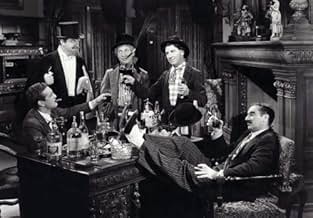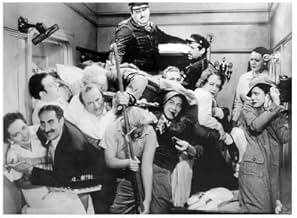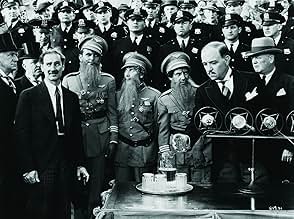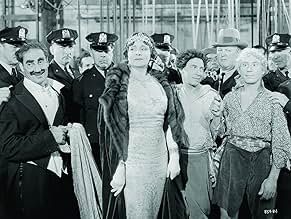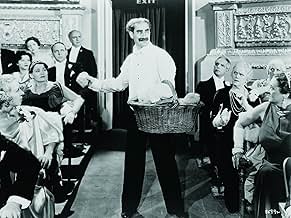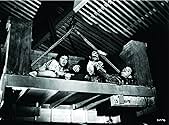AVALIAÇÃO DA IMDb
7,8/10
35 mil
SUA AVALIAÇÃO
Um gerente de negócios astuto e dois amigos loucos de dois cantores de ópera os ajudam a alcançar o sucesso enquanto humilham seus inimigos estúpidos e sufocantes.Um gerente de negócios astuto e dois amigos loucos de dois cantores de ópera os ajudam a alcançar o sucesso enquanto humilham seus inimigos estúpidos e sufocantes.Um gerente de negócios astuto e dois amigos loucos de dois cantores de ópera os ajudam a alcançar o sucesso enquanto humilham seus inimigos estúpidos e sufocantes.
- Prêmios
- 2 vitórias no total
Walter Woolf King
- Rudolfo Lassparri
- (as Walter King)
Sig Ruman
- Herman Gottlieb
- (as Siegfried Rumann)
Robert Emmett O'Connor
- Police Sergeant Henderson
- (as Robert Emmet O'Connor)
Enrique Acosta
- Nightclub Guest
- (não creditado)
Harry Adams
- Opera Spectator
- (não creditado)
Harry Allen
- Doorman
- (não creditado)
Sam Appel
- Dungeon Guard
- (não creditado)
King Baggot
- Dignitary
- (não creditado)
Marion Bell
- Lady looking for 'Aunt Minnie'
- (não creditado)
Edna Bennett
- Maid
- (não creditado)
Dolly Blackburn
- Little Girl watching Harpo playing
- (não creditado)
Enredo
Você sabia?
- CuriosidadesIn exasperation after several attempts to have Groucho Marx read one of his lines in the manner director Sam Wood had requested, Wood exclaimed, "I guess you just can't make an actor out of clay." Groucho Marx instantly responded, "Nor a director out of Wood."
- Erros de gravaçãoRicardo is clearly standing on the dock as the ship pulls away, yet he turns up on board later as a stowaway.
- Citações
Otis B. Driftwood: It's all right, that's in every contract. That's what they call a sanity clause.
[Fiorello laughs loudly]
Fiorello: You can't fool me! There ain't no Sanity Claus!
- Versões alternativasAll references to the first portion of the film taking place in Italy were edited from the original negative sometime after the original release. There is speculation that this was done during WWII when Italy was as Axis power, but it also may have been done in the late 1930's to appease Mussolini, who didn't like the way Italians were being portrayed. Either way, the film's first scene begins rather abruptly and is missing a musical number and references to Milan, Italy.
- ConexõesEdited into Apaga y vámonos: Episode #1.5 (2013)
- Trilhas sonorasIl Trovatore: Di quella pira
(1853) (uncredited)
Music by Giuseppe Verdi
Libretto by Leone Emanuele Bardare and Salvatore Cammarano
Sung by Walter Woolf King
with The MGM Symphony Orchestra
Avaliação em destaque
Though some claim that either HORSE FEATHERS OR DUCK SOUP was the greatest Marx Brothers opus, A NIGHT AT THE OPERA has to be Marxdom's signature film. The witticisms and riotous madcap from playwright George Kaufman (THE MAN WHO CAME TO DINNER; YOU CAN'T TAKE IT WITH YOU) is evident everywhere in the some of the team's finest composition of wit and physical comedy.
After taking over MGM studios in the 1930's, big-wig Irving Thallberg pulled the Marx Bros. aside and told them, "You know, you guys are missing only one thing in your pictures: you never help anybody." After OPERA, the Marx Brothers' scripts always revolved around either an attempt to get a romantic couple together or became an effort to save an institution from going under, i.e., THE BIG STORE; A DAY AT THE RACES; HORSE FEATHERS; THE BIG CIRCUS.
Margaret Dumont is established once and for all as Groucho's perfect romantic staple and a Marx Bros. movie just doesn't seem right without her. Sig Rumond appears to have been created in a Marx Brothers comedy factory and serves sensationally as the urbane Marx antagonist vying for Dumont's favors, though upended time and time again by Groucho. A young Kitty Carlisle and Allen Jones provide the romance and music--though many audiences never realize how fine an operatic voice Carlisle had in those days.
So many hilarious and classic routines fill A NIGHT AT THE OPERA that the movie offers itself as a study in Komedy 101: the unforgettable "contract" bit between Chico and Groucho (Chico can't read). As they try to sign an agreement about the rights to manage singer Allen Jones, they tear clause after clause off the paper until Chico finally asks: "What's this?" "Oh," replies Groucho, "that's just a sanity clause." Chico bursts out laughing. "Oh, you canna' fool me; there ain't' no sanity Klaus!..." The crowded state room scene where Groucho, Chico, and Hapro stow-away in a tiny cubicle and the shoebox crams with more and more people until Mrs. Claypool (Dumont) opens the door and everyone spills out...The hotel scene where Detective Henderson tries to nail the brothers for stowing-away and everyone races back and forth between suites, furniture is switched, and Henderson is left wondering if he's nuts...
But it is the film's finale during a live performance at the New York opera house that is perhaps the comedy team's grandest movie climax. The police, still after Harpo for stowing away, try to arrest him during a live performance. He breaks through the theater's backstage, swings over the proscenium like a trapeze artist, and, at one point, tears off the dress of one of the singers. "Well, now we're finally getting somewhere!" Groucho opines from the audience.
What a shame A NIGHT AT THE OPERA is not on television more often. Young people should be treated to comedy as it once was when laughter depended upon uproarious wit and a brand of physical comedy perfected by comedians through years of refining their craft in vaudeville.
A NIGHT AT THE OPERA is nothing less than an American comedy classic.
Trivia: Maragaret Dumont appeared with Groucho on THE Hollywood PALACE television show in 1965 and the couple did a brief repartee from GROUCHO's famous Captain Spaulding routine. The next day Dumont passed away...Her last film was in 1964 in the star-studded WHAT A WAY TO GO...Always playing a haughty spinstress with money, Dumont was, in fact, a millionairess in real life and commuted between Hollywood and London....Few realize what a fine operatic singer Kitty Carlisle was in the 1930's. In the 1950's and '60's she was a regular panelist on television quiz shows such as I'VE GOT A SECRET...She was also married to playwright Moss Hart who collaborated with George Kaufman on YOU CAN'T TAKE IT WITH YOU, THE MAN WHO CAME TO DINNER, and many other plays. YOU CAN'T won the Pulitzer Prize...Allen Jones was the father of popular singer Jack Jones...Groucho said that it was while hanging out of an airplane in A NIGHT IN CASABLANCA (1946) that he finally realized the brothers had pretty much reached the end of the line in movies...The last picture in which all three brothers appeared was THE STORY OF MANKIND in 1957. Groucho played the part of Sir Isaac Newton...Groucho wrote many books: MEMOIRS OF A MANGY LOVER and LETTERS FROM GROUCHO...Harpo Marx also wrote his own autobiography: HARPO SPEAKS--a fine expose of the brothers' early years and the many stage shows they did perfecting their mayhem...When the stock market crashed in 1929, Groucho lost every dime he had: about $250,000...In the 1950's Groucho hosted his own television quiz show,YOU BET YOUR LIFE and both Harpo and Chico made surprise appearances...Chico was a lifetime gambler and would bet on anything...MINNIE'S BOYS, a stage play about the influence of Marx mother Minnie, was pretty much a flop in the 1970's...One of the all-time great quotations about the Marx Brothers came from playwright George Kaufman who, after watching the comedy team tear apart his script on stage in the early years, observed: "I could have sworn I just heard one of the original lines from the play."...Groucho was self-conscious about his lack of formal education and once had the chance to meet poet T.S. Eliot. He read many of Eliot's works and boned up on literature. When the two men did finally meet, all Eliot wanted to talk about was A NIGHT AT THE OPERA...One of Groucho's final performances just before he died was at Carnegie Hall in New York and it was a smashing success. He was accompanied by pianist Marvin Hamlisch...Film critic James Agee once said that the worst thing the Marx Brothers ever did was still better than everybody else...
Dennis Caracciolo
After taking over MGM studios in the 1930's, big-wig Irving Thallberg pulled the Marx Bros. aside and told them, "You know, you guys are missing only one thing in your pictures: you never help anybody." After OPERA, the Marx Brothers' scripts always revolved around either an attempt to get a romantic couple together or became an effort to save an institution from going under, i.e., THE BIG STORE; A DAY AT THE RACES; HORSE FEATHERS; THE BIG CIRCUS.
Margaret Dumont is established once and for all as Groucho's perfect romantic staple and a Marx Bros. movie just doesn't seem right without her. Sig Rumond appears to have been created in a Marx Brothers comedy factory and serves sensationally as the urbane Marx antagonist vying for Dumont's favors, though upended time and time again by Groucho. A young Kitty Carlisle and Allen Jones provide the romance and music--though many audiences never realize how fine an operatic voice Carlisle had in those days.
So many hilarious and classic routines fill A NIGHT AT THE OPERA that the movie offers itself as a study in Komedy 101: the unforgettable "contract" bit between Chico and Groucho (Chico can't read). As they try to sign an agreement about the rights to manage singer Allen Jones, they tear clause after clause off the paper until Chico finally asks: "What's this?" "Oh," replies Groucho, "that's just a sanity clause." Chico bursts out laughing. "Oh, you canna' fool me; there ain't' no sanity Klaus!..." The crowded state room scene where Groucho, Chico, and Hapro stow-away in a tiny cubicle and the shoebox crams with more and more people until Mrs. Claypool (Dumont) opens the door and everyone spills out...The hotel scene where Detective Henderson tries to nail the brothers for stowing-away and everyone races back and forth between suites, furniture is switched, and Henderson is left wondering if he's nuts...
But it is the film's finale during a live performance at the New York opera house that is perhaps the comedy team's grandest movie climax. The police, still after Harpo for stowing away, try to arrest him during a live performance. He breaks through the theater's backstage, swings over the proscenium like a trapeze artist, and, at one point, tears off the dress of one of the singers. "Well, now we're finally getting somewhere!" Groucho opines from the audience.
What a shame A NIGHT AT THE OPERA is not on television more often. Young people should be treated to comedy as it once was when laughter depended upon uproarious wit and a brand of physical comedy perfected by comedians through years of refining their craft in vaudeville.
A NIGHT AT THE OPERA is nothing less than an American comedy classic.
Trivia: Maragaret Dumont appeared with Groucho on THE Hollywood PALACE television show in 1965 and the couple did a brief repartee from GROUCHO's famous Captain Spaulding routine. The next day Dumont passed away...Her last film was in 1964 in the star-studded WHAT A WAY TO GO...Always playing a haughty spinstress with money, Dumont was, in fact, a millionairess in real life and commuted between Hollywood and London....Few realize what a fine operatic singer Kitty Carlisle was in the 1930's. In the 1950's and '60's she was a regular panelist on television quiz shows such as I'VE GOT A SECRET...She was also married to playwright Moss Hart who collaborated with George Kaufman on YOU CAN'T TAKE IT WITH YOU, THE MAN WHO CAME TO DINNER, and many other plays. YOU CAN'T won the Pulitzer Prize...Allen Jones was the father of popular singer Jack Jones...Groucho said that it was while hanging out of an airplane in A NIGHT IN CASABLANCA (1946) that he finally realized the brothers had pretty much reached the end of the line in movies...The last picture in which all three brothers appeared was THE STORY OF MANKIND in 1957. Groucho played the part of Sir Isaac Newton...Groucho wrote many books: MEMOIRS OF A MANGY LOVER and LETTERS FROM GROUCHO...Harpo Marx also wrote his own autobiography: HARPO SPEAKS--a fine expose of the brothers' early years and the many stage shows they did perfecting their mayhem...When the stock market crashed in 1929, Groucho lost every dime he had: about $250,000...In the 1950's Groucho hosted his own television quiz show,YOU BET YOUR LIFE and both Harpo and Chico made surprise appearances...Chico was a lifetime gambler and would bet on anything...MINNIE'S BOYS, a stage play about the influence of Marx mother Minnie, was pretty much a flop in the 1970's...One of the all-time great quotations about the Marx Brothers came from playwright George Kaufman who, after watching the comedy team tear apart his script on stage in the early years, observed: "I could have sworn I just heard one of the original lines from the play."...Groucho was self-conscious about his lack of formal education and once had the chance to meet poet T.S. Eliot. He read many of Eliot's works and boned up on literature. When the two men did finally meet, all Eliot wanted to talk about was A NIGHT AT THE OPERA...One of Groucho's final performances just before he died was at Carnegie Hall in New York and it was a smashing success. He was accompanied by pianist Marvin Hamlisch...Film critic James Agee once said that the worst thing the Marx Brothers ever did was still better than everybody else...
Dennis Caracciolo
- dencar_1
- 5 de abr. de 2005
- Link permanente
Principais escolhas
Faça login para avaliar e ver a lista de recomendações personalizadas
Detalhes
- Data de lançamento
- País de origem
- Idiomas
- Também conhecido como
- A Night at the Opera
- Locações de filme
- Empresa de produção
- Consulte mais créditos da empresa na IMDbPro
Bilheteria
- Faturamento bruto mundial
- US$ 5.320
- Tempo de duração1 hora 36 minutos
- Cor
- Proporção
- 1.37 : 1
Contribua para esta página
Sugerir uma alteração ou adicionar conteúdo ausente

Principal brecha
By what name was Uma Noite na Ópera (1935) officially released in India in English?
Responda


